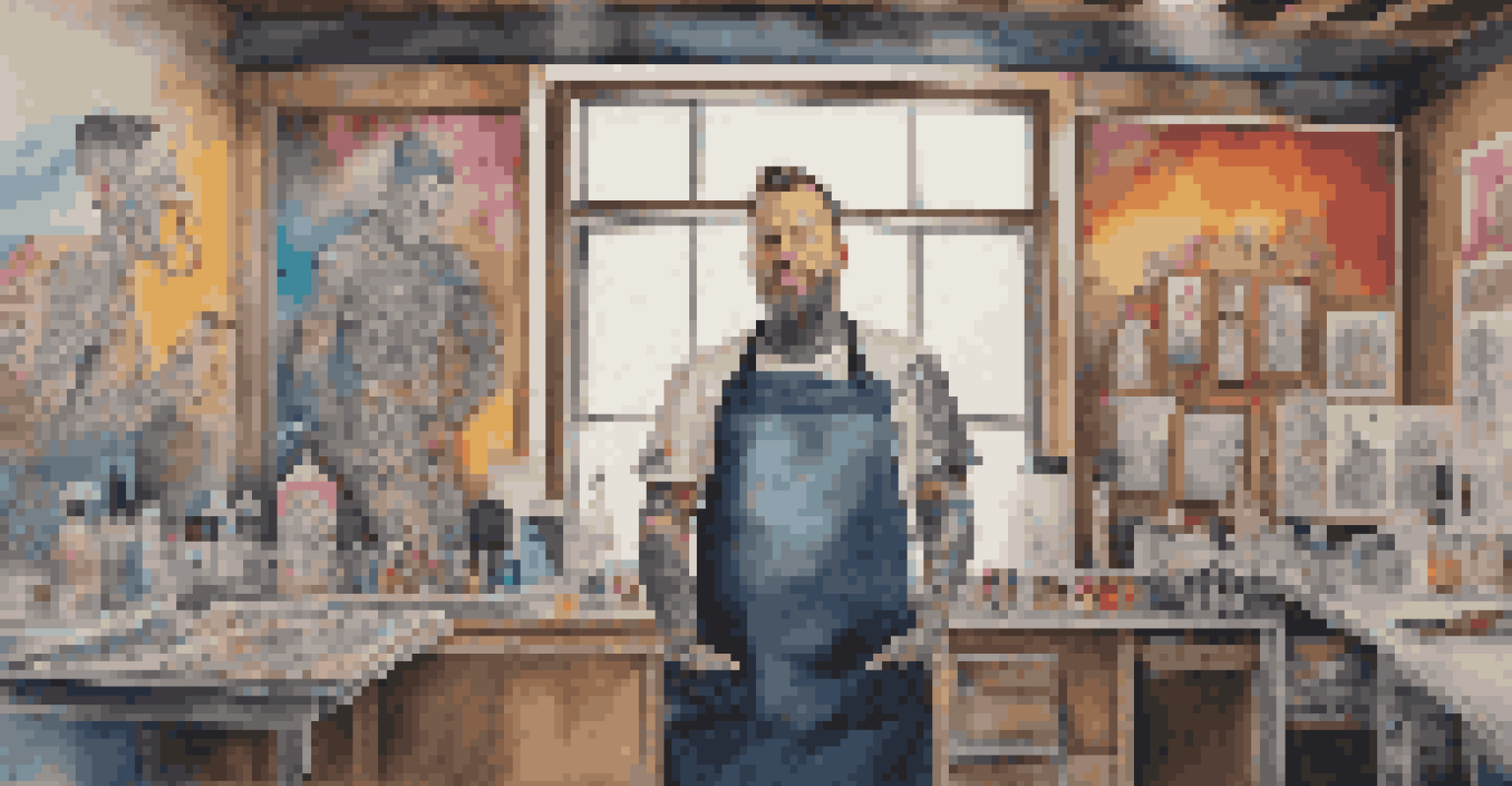The Journey of a Tattoo Artist: From Apprentice to Pro

Understanding the Tattoo Art Form and Its History
Tattooing is not just a trend; it's an ancient art form that dates back thousands of years. From tribal markings to intricate designs, tattoos have served various purposes across cultures, including rites of passage and expressions of identity.
Tattooing is a way of life for me. It is an expression of who I am and what I believe.
To appreciate the journey of a tattoo artist, it's important to understand the rich history behind the art. Each tattoo tells a story, and artists often draw inspiration from historical motifs, personal experiences, and cultural symbols.
As tattooing has evolved, so have the techniques and styles, creating a vibrant tapestry of artistry that today's tattooists must navigate. This historical context sets the stage for the journey an aspiring tattoo artist will embark on.
The Initial Steps: Becoming an Apprentice
The journey typically begins with an apprenticeship, where aspiring artists learn the ropes under the guidance of experienced tattooists. This stage is crucial, as it provides hands-on experience and insight into the tattooing process, from sanitation to design.

An apprentice must be willing to observe, ask questions, and practice on synthetic skin before working on real clients. It's a period of immense learning and sometimes challenging tasks, like cleaning and preparing the studio.
Tattooing's Rich Historical Roots
Understanding the history of tattooing enhances appreciation for the artistry and personal stories behind each tattoo.
This foundational experience is essential for building the skills and confidence needed to become a professional tattoo artist. It’s during this time that many artists discover their unique style and voice within the tattoo community.
Developing Skills: The Art of Tattooing
As apprentices progress, they start to hone their skills in various tattooing techniques. Mastery of line work, shading, and color application becomes essential, as these elements significantly impact the final piece.
A tattoo is a story that the skin tells. Each piece is a reflection of the artist and the client.
Practicing on different mediums and styles, from traditional to contemporary, helps artists find their niche. This exploration allows them to develop a personal style that resonates with their artistic vision and clientele.
Receiving constructive feedback from mentors and clients also plays a critical role in skill development. Each tattoo becomes a learning opportunity, pushing the artist closer to professional mastery.
Building a Portfolio: Showcasing Your Work
Creating a strong portfolio is vital for tattoo artists looking to establish themselves in the industry. A well-curated collection of their best work demonstrates their skills and artistic style to potential clients.
Photographing completed tattoos in good lighting, capturing the details and colors accurately, is essential. An online presence, through a website or social media, can help artists reach a broader audience and attract clients.
The Importance of Apprenticeships
Starting as an apprentice is crucial for aspiring tattoo artists, providing hands-on experience and foundational skills.
As an artist grows, their portfolio evolves, reflecting their journey and experiences. It's a visual narrative of their growth, creativity, and the unique stories they craft for their clients.
Finding Your Style: The Importance of Individuality
As tattoo artists gain experience, they naturally gravitate towards specific styles that resonate with them. Whether it's neo-traditional, watercolor, or blackwork, finding a niche can set them apart in a competitive market.
Developing a unique style allows artists to express their individuality and connect with clients who appreciate their vision. This personal touch often leads to more meaningful tattoos, as the artist’s passion shines through.
Moreover, artists can continue to innovate within their chosen style, ensuring they stay relevant and inspired. The journey to finding one’s artistic voice is both personal and essential for long-term success.
Building Client Relationships: The Heart of Tattooing
Tattooing is as much about artistry as it is about building relationships with clients. Establishing trust and understanding their stories helps artists create meaningful tattoos that clients cherish.
Good communication is key; artists must listen to clients’ ideas and provide feedback while ensuring they feel comfortable throughout the process. This supportive atmosphere encourages repeat business and referrals.
Building Relationships with Clients
Establishing trust and communication with clients is essential for creating meaningful tattoos and fostering loyal relationships.
Over time, strong relationships can turn clients into loyal patrons and friends. Many artists find that these connections enrich their work and contribute to a fulfilling career.
Continuing Education: Staying Current in the Industry
The tattoo industry is constantly evolving, with new techniques, styles, and trends emerging regularly. Successful tattoo artists commit to lifelong learning, attending workshops, conventions, and networking events to stay updated.
This commitment to education not only enhances their skills but also fosters a sense of community among tattoo artists. Collaborating and sharing knowledge with peers can lead to innovative approaches and greater creativity.

Additionally, following industry leaders and engaging with online resources keeps artists inspired and informed. This ongoing education ultimately elevates their craft and helps them adapt to the ever-changing landscape of tattooing.
The Road to Professionalism: Becoming a Master Tattoo Artist
After years of dedication, practice, and growth, many tattoo artists reach a point where they can call themselves masters of their craft. This title is not just about skill; it encompasses professionalism, ethics, and a deep understanding of the art form.
Master tattoo artists often share their knowledge, mentoring new apprentices and contributing to the community. Their journey becomes a source of inspiration for others, fostering a new generation of talented artists.
Ultimately, the path from apprentice to pro is filled with challenges and triumphs, but for those passionate about tattooing, it is a rewarding journey that shapes their identity as artists and individuals.